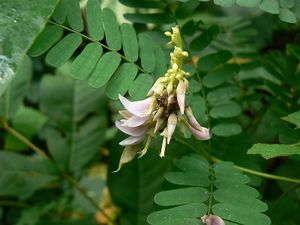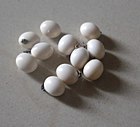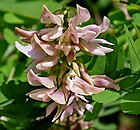Note: This is a project under development. The articles on this wiki are just being initiated and broadly incomplete. You can Help creating new pages.
Difference between revisions of "Abrus precatorius - Gunja"
(→Parts Used) |
(→Chemical Composition) |
||
| Line 13: | Line 13: | ||
==Chemical Composition== | ==Chemical Composition== | ||
| − | + | Mature seeds contain alkali like abrine, precatorine, etc., abraline; toxalbumin like abrin I, II, III, etc., abrus agglutinin I, II (A. P. A Ⅰ, Ⅱ), sterols like abricin, squnalene, alcohol likeβ-amyrin, cycloartenol, 5β-cholanic acid, abrussic acid, sophoradiol, trimethyltryptophan abrusin galactose, arabinose, xylose, polysaccharide and flavonoids compounds, Seed covers contain gallic acid, abranin), delphinidin.<ref name="chemical composition"/> | |
==Common names== | ==Common names== | ||
Revision as of 09:47, 6 April 2018
Abrus precatorius is a severely invasive plant in warm temperate to tropical regions, so much so that it has become effectively pantropical in distribution. It had been widely introduced by humans, and the brightly coloured and hard-shelled seeds had been spread by birds.
Contents
Uses
migraines, headaches, vomiting, piles, burning sensation, perspiration problems, burning sensation in the vagina.
Parts Used
mature seeds, stem, leaves, Root.
Chemical Composition
Mature seeds contain alkali like abrine, precatorine, etc., abraline; toxalbumin like abrin I, II, III, etc., abrus agglutinin I, II (A. P. A Ⅰ, Ⅱ), sterols like abricin, squnalene, alcohol likeβ-amyrin, cycloartenol, 5β-cholanic acid, abrussic acid, sophoradiol, trimethyltryptophan abrusin galactose, arabinose, xylose, polysaccharide and flavonoids compounds, Seed covers contain gallic acid, abranin), delphinidin.[1]
Common names
| Language | Common name |
|---|---|
| Kannada | Gulaganji |
| Hindi | Gaungchi, Gunchi |
| Malayalam | Kunni, Kunnikkuru |
| Tamil | Gundumani, Kundumani |
| Telugu | Gurivinda or Guriginja |
| Marathi | NA |
| Gujarathi | NA |
| Punjabi | NA |
| Kashmiri | NA |
| Sanskrit | Gunja |
| English | equirity |
Habit
Identification
Leaf
| Kind | Shape | Feature |
|---|---|---|
| glabrous | sessile | The leaves are variable in shape and size |
.[2]
Flower
| Type | Size | Color and composition | Stamen | More information |
|---|---|---|---|---|
| Unisexual | 2-4cm long | white–violet | 10-18 | Flowers are Large, hooded and occur in slender racemes or lax leafy panicles. Corolla is hairy. Carpels are five in number |
Fruit
| Type | Size | Mass | Appearance | Seeds | More information |
|---|---|---|---|---|---|
| 7–10 mm (0.28–0.4 in.) long pome | s | {{{6}}} |
Other features
List of Ayurvedic medicine in which the herb is used
- Vishatinduka Taila as root juice extract
Where to get the saplings
Mode of Propagation
How to plant/cultivate
The more common species of Aconitum are generally those cultivated in gardens, especially hybrids. They typically thrive in well-drained evenly moist garden soils like the related hellebores and delphiniums, and can grow in the shade of trees.[3]
Commonly seen growing in areas
Belize, Caribbean Islands, Hawaii, pinelands, hammocks.
Photo Gallery
References
External Links
- Pages that are stubs
- Ayurvedic Herbs known to be helpful to treat migraines
- Ayurvedic Herbs known to be helpful to treat headaches
- Ayurvedic Herbs known to be helpful to treat vomiting
- Ayurvedic Herbs known to be helpful to treat piles
- Ayurvedic Herbs known to be helpful to treat burning sensation
- Ayurvedic Herbs known to be helpful to treat perspiration problems
- Ayurvedic Herbs known to be helpful to treat burning sensation in the vagina
- Herbs with mature seeds used in medicine
- Herbs with stem used in medicine
- Herbs with leaves used in medicine
- Herbs with Root used in medicine
- Herbs with common name in Kannada
- Herbs with common name in Hindi
- Herbs with common name in Malayalam
- Herbs with common name in Tamil
- Herbs with common name in Telugu
- Herbs with common name in Sanskrit
- Herbs with common name in English
- Habit - Herb
- Index of Plants which can be propagated by Seeds
- Index of Plants which can be propagated by Tuber segment
- Herbs that are commonly seen in the region of Belize
- Herbs that are commonly seen in the region of Caribbean Islands
- Herbs that are commonly seen in the region of Hawaii
- Herbs that are commonly seen in the region of pinelands
- Herbs that are commonly seen in the region of hammocks
- Herbs






